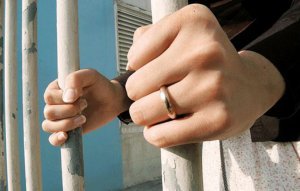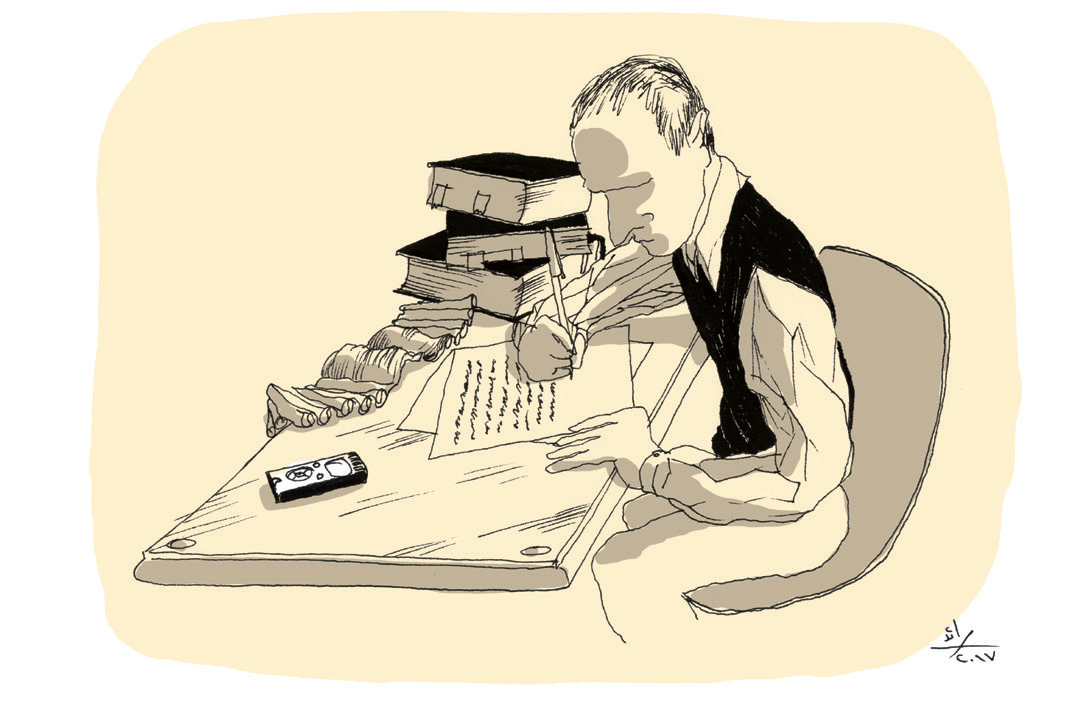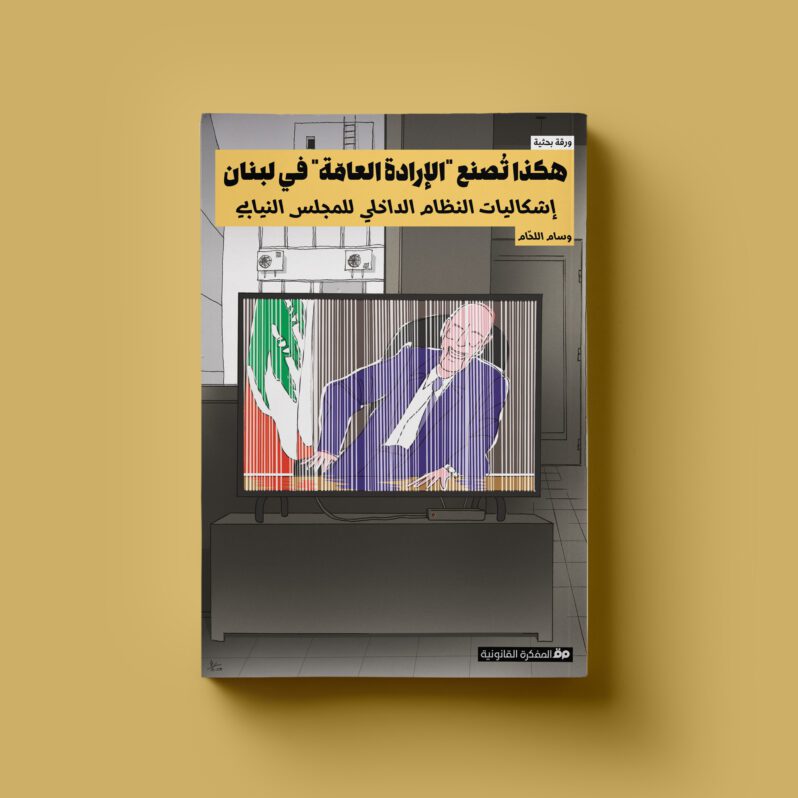When Journalists and Judges Unite: The Case of Yusra al-Amiri

The relationship between the media and the judiciary in Lebanon was not always crisis-ridden, caught between the “dignity” (of the judiciary) and “freedom” (of the press). There were in fact numerous instances of media outlets championing key judicial issues. One of the most prominent was the case of Iraqi refugee Yusra al-Amiri, when several media outlets defended the judiciary’s ruling for her release. The General Directorate of General Security (GDGS) had initially refrained from carrying out the ruling and judicial authorities remained silent as if the actions of the GDGS were of no concern to them. The media campaign that ensued, however, eventually led the GDGS to comply.
The case dates back to December 11, 2009, when Summary Affairs Judge Cynthia Kasarji in Zahle issued a landmark ruling ordering al-Amiri’s immediate release. The latter had filed a lawsuit against the Lebanese state, the Interior Ministry and the GDGS for arbitrarily detaining her for months without legal basis. The ruling was the first in Lebanon to describe GDGS practices, systematically and inveterately employed by the GDGS, as arbitrary detention. By law, arbitrary detention is a felony punishable by temporary hard labor, as per Article 367 of the Lebanese Penal Code.
Yet, the GDGS did not carry out the ruling, and kept al-Amiri detained. Her attorney and the activists supporting her case (most prominently the Frontiers Ruwad Association) were confronted with the lack of procedures to compel state administrations to implement judicial rulings. This forced them to shift the confrontation from the judiciary to the media. The latter soon turned into their main ally in “liberating” the Iraqi refugee, as well as in defending the judiciary and its rulings.[1]
As a result, most Lebanese newspapers –in particular al-Akhbar, as-Safir and to a lesser extent an-Nahar– dedicated several pages (sometimes even front page headlines) to covering this case. On January 20, 2010, the ruling was carried out. The media was present to film al-Amiri’s release which was broadcasted as a leading item on the evening newscast of the Al-Jadeed and OTV television channels. In fact, some media outlets went as far as to speak of the GDGSs insubordination or rebellion against the ruling.[2]
Initially, the GDGS invoked a number of pretexts for refusing to carry out the ruling. Chief among those was the fact that the detained Iraqi refugee did not have a residency permit, which the Directorate audaciously added, permitted the detention of al-Amiri as soon as she was released. The GDGS also shed doubt on the validity of al-Amiri’s refugee status.
The former General Director of General Security, the late Major General Wafic Jezzini, as quoted in al-Akhbar, went as far as to say that it appeared, following “a meeting with senior GDGS officers”, that Judge Kasarji “does not know what she is doing”. Jezzini said that if Kasarji knew of “the legal procedure laid out in the memorandum of understanding ratified with the UN Refugee Agency (UNHCR), she would not have issued a release order”.[3] He even added that “this issue does not concern the judiciary”.[4]
Such pretexts suggest that the issue was already settled for the GDGS: that the judiciary has no role to play when it comes to foreigners, whatever the case may be. Additionaly, if a judge were to issue a ruling, it would not matter because such a ruling would never be carried out.
The facts also suggest that the GDGS submitted to the ruling reluctantly and gradually as a result of media pressure. Following an inflammatory article on the front page of al-Akhbar entitled “General Security Rebels Against Judiciary”,[5] the GDGS handed over the Iraqi refugee to a shelter run by the charity organization Caritas, provided that al-Amiri remains detained there on behalf of the Directorate. The arrangement led to the launch of an email and SMS campaign against Caritas. The campaign opposed the charity’s involvement in the case, and denounced it for providing the GDGS with the means to elude the ruling by agreeing to detain al-Amiri on its behalf.
On the day she was released, al-Amiri was supposed to take part in an interview at the UNHCR leading up to her resettlement. The Iraqi refugee arrived at the UNHCR flanked by Caritas employees who refused to release her. Their response to questioning journalists was that al-Amiri would “remain in our care until her case is resolved”. However, neither the intransigence of Caritas nor that of the GDGS lasted long under the spotlight of the cameras that flocked to the gates of the UNHCR. The charity washed its hands of al-Amiri and the ruling was fully carried out at last.
The issue, however, did not end there. Journalists who had followed and written about the case had accused certain parties of violating judicial rulings, and of engaging in arbitrary detention. These parties threatened to sue for defamation, and in some cases, followed through with their threats.
Caritas, for example, threatened to take journalist Omar Nashabe to court for what he published about the case and about Caritas’s refusal to release the refugee, but did not follow up on the matter.[6] Similarly, General Jezzini filed a lawsuit for defamation with the Public Prosecutor’s Office at the Court of Cassation against another then-al-Akhbar journalist, Khaled Saghieh. The suit referenced an article the latter had written about the al-Amiri’s case, and in particular, the GDGSs insubordination and refusal to carry out a judicial ruling. In his article, Saghieh had asserted that “no one wants to uphold the judiciary”, but only “to silence those who would speak up”.[7]
The al-Amiri case also had a wider impact, with other judges issuing similar rulings about other refugees arbitrarily detained for periods of up to three years. Two such prominent rulings were issued by Judge Mireille Haddad on January 28, 2010 and Judge Zalfa al-Hassan on June 8, 2010. A number of media outlets remained committed to highlighting such rulings and demanding their implementation.[8]
It is worth noting that contrary to the media’s role in defending the judges concerned and their rulings, two of the country’s main judicial authorities, namely the Justice Minister and the Supreme Judicial Council (SJC), were silent on the matter. Such silence stood in stark contrast to the enthusiasm they both often display in defending the dignity of the judiciary if it is ever harshly criticised by the media, regardless of whether such criticism is justified or not. More significantly, neither parties took any action to ensure the implementation of the rulings in question. Nor did they try to put an end to the felony of arbitrary detention, as practiced by the GDGS against a large number of refugees, sometimes for as long as three to four years.
In fact, over a period of two years (2009-2010), nearly 17 rulings were issued against government administrative bodies, declaring them guilty of engaging in arbitrary detention and violating personal freedoms. Such rulings have continuously been showcased and commended by several media outlets.
In sum, the experience of judges and journalists fighting together represented a significant breakthrough, allowing them to discover the possibilities of working together without any kind of support from the state. Such an experience clearly shows that the relationship between the media and the judiciary can emerge from the stereotypical binary of “dignity” and “freedom”.
It also shows that the two professions can be united in fulfilling their most noble function: that of protecting the most vulnerable segments of society from the latter’s most influential powers. These influential powers took note of how dangerous this union of the judiciary and the media can be for them in the long run. It is no wonder that such a union was, and remains, undesirable to them.
This article is an edited translation from Arabic.
____________________________________________________________________
[1] Refer to “Resorting to Arbitrary Detention: a Policy Above the Constitution”, the Frontiers Ruwad Association, 2010.
[2] Lebanese Newspapers an-Nahar, dated December 16, 2009; al-Akhbar, dated September 15, 2009; al-Safir, dated January 15, 2010; and el-Balad, dated January 19, 2010.
[3] See Omar Nashabe & Bissan Tay’s: “No Freedom for Yusra al-Amiri Despite Judicial Ruling”, al-Akhbar, dated January 16, 2010.
[4] Idem.
[5] Al-Akhbar, dated January 16, 2010.
[6] See Omar Nahsabe’s: “Let’s Go to Court”, al-Akhbar, dated January 19, 2010.
[7] See Khaled Saghieh’s: “Yusra al-Amiri”, al-Akhbar, dated January 18, 2010.
[8] See note 1 above, idem.



